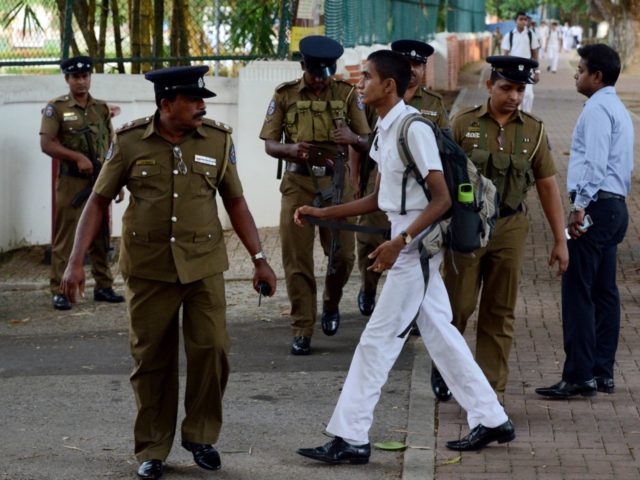Authorities continued imposing curfews Wednesday night in Sri Lanka after a wave of largely Sinhalese Buddhist led vandalism on Muslim businesses and mosques prompted a nationwide law enforcement effort to protect the nation’s Muslim minority.
The mobs attacking Muslims areas are a reaction to the mass murder of over 250 people on Easter Sunday in a string of suicide bombings targeting three churches and three hotels hosting Easter breakfast. The Islamic State took responsibility for the bombing, identifying Sri Lankan cleric Mohammed Zahran Hashim as the mastermind of the attacks.
A spokesperson for the national police, Ruwan Gunasekara, told reporters Wednesday that law enforcement had arrested 78 people in the island nation’s northwest for inciting violence against Muslims. Nationwide, that number rose to 100 suspects in acts of violence, mostly vandalism, against locales believed to be owned by Muslims. Curfews remain in place, though some individuals have violated them to continue the attacks. The Sri Lankan military has also deployed to contain the mobs, scheduling Air Force helicopter surveillance to monitor “illegal assemblies.”
Prior to the attacks overnight Tuesday and Wednesday, mobs vandalized six mosques during curfew on Monday. Local media reported that surveillance camera footage of the attacks appeared to show police and security forces standing by while the vandalism occurred, doing nothing to stop it.
Despite the jihadist attacks targeting Christians, most attacks on Muslims appear to be the work of the Buddhist majority, authorities have said. The Colombo Telegraph, a local newspaper, published a video Thursday of a Buddhist monk harassing patrons in a Muslim-owned business, specifically identifying customers he believed to be Sinhalese and urging them to leave. According to the owner of the stop, the monk told customers not to “buy things in the shops of these people.”
“Here see, in their Quran it says, Allah created all lives and will give everyone their food & provisions, so then why these people have come to our country and eating from our Sinhala people?” the owner claimed the monk told shoppers.
Elsewhere the confrontations were reportedly more violent. Sri Lanka’s Daily Mirror published a photo gallery of the damage in Kuliyapitya and Minuwangoda, two of the most affected areas. Mobs left blocks of businesses with broken windows, damaged merchandise, and burned down entire storefronts in some cases. The newspaper documented the destruction of 41 businesses in Minuwangoda alone, along with four residences, four vehicles, and a mosque.
“According to eyewitnesses, the mobs who arrived on motorbikes were armed with rods and swords,” the newspaper reported. The mobs attacked all businesses they suspected of being owned by Muslims, which resulted in the destruction of some Sinhalese Buddhist storefronts. Ekko, a textile shop in Minuwangoda owned by a Buddhist woman, burned to the ground after a mob attempted arson against a nearby business.
“The attackers are so stupid to attack shops and land the country’s economy in problems. The loss of my shop would be more than 20 million. The destruction could have been minimised, but the Fire Brigade came hours later than expected,” Chandima, the owner, told the Mirror.
A Christian man, identified as M.H.J.P.Perera, also told the Mirror that the mobs burned down their glass store despite his Catholic faith.
“About twenty motorcycles were outside my shop. When they started attacking, I shouted saying ‘I am Sinhalese. Please do not attack.’ My pleas went unheeded as the mobs continued destroying my property,” he told the newspaper. He said he suspected the mob attacked his business because his son-in-law is Muslim.
Witnesses told the Mirror that police did little to stop the attacks, suspecting that locals supported the attacks to contain the radical Islamist threat and thus provided little incentive for the police to stop.
The government is attempting to convince rioters not to attack Muslims areas. President’s Counsel Ali Sabry made the case by suggesting that National Thowheed Jamath (NTJ) the domestic group Zahran Hashim founded that executed the Easter attack on behalf of the Islamic State, grew exponentially following “ethnic clashes” in 2018.
“He said Zahran’s terrorist group had only 20-25 members in the past, but after last year’s unfortunate clashes in Digana a large number of youths had joined them and this has been confirmed through statements,” national news outlet Ada Derana reported.
Zahran’s was far from the only mosque in his neighborhood of Kattankudy, a township on the outskirts of Colombo. Police found that, out of the dozens of mosques there, 11 openly preached Islamic fundamentalism. Nationwide raids revealed multiple weapons caches at mosques throughout the nation.
The police activity has not prevented Muslims from using the mosques. International reports portray Muslims as “defiant” in the face of investigations following the Christian massacre last month. Christians, fearing another bombing, were forced to forego religious services until last Sunday, when heavily armed churches opened their doors for the first time since the attack.
Police have deported 200 foreign Muslim clerics since Easter and have prepared to deport over 600 foreigners for visa violations since the bombings. Domestically, police have imprisoned dozens for ties to the bombings or on suspicions of unrelated jihadist activity. Police have arrested so many people that the prisons have become overcrowded, so much so that some prisons have four or five inmates sharing a cell.

COMMENTS
Please let us know if you're having issues with commenting.